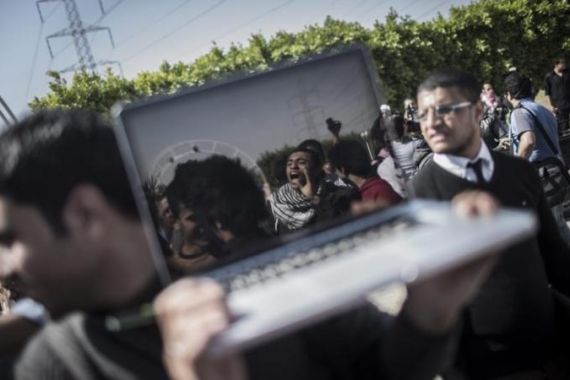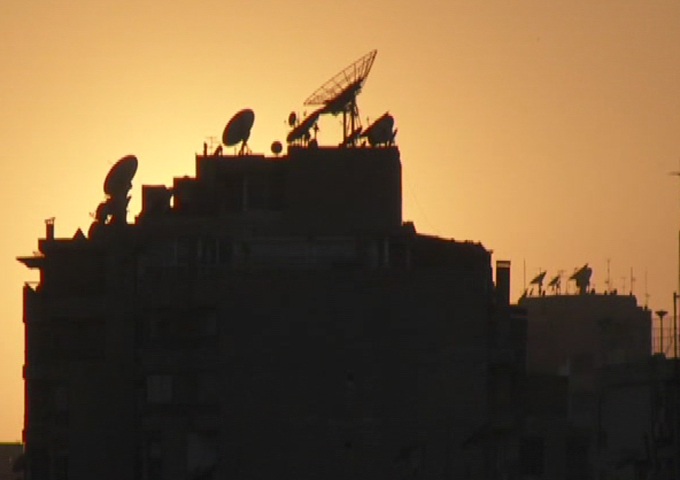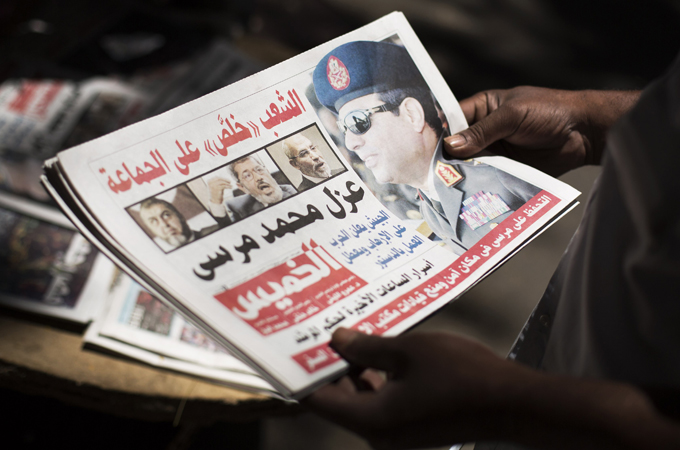Cracking down on Egypt’s ‘terrorist’ media
The detention and censorship of journalists has escalated since the military coup in July.

Cairo, Egypt – Mostapha had an idea. The young video journalist, employed by the Egyptian state-owned newspaper Gomhoriya, had recently traveled to Upper Egypt to film the harsh living conditions people face there, and wanted to put a short film online.
His editor – appointed to the newspaper by former president Mohamed Morsi’s administration – said “no”.
Instead, he “invited me to cover news about the Muslim Brotherhood’s public services”, Mostapha told Al Jazeera, and to film the streets of Cairo with two caveats: the roadways must be clean and devoid of traffic.
Mostapha – who asked that his real name not be used for security reasons – objected, accusing his editor of whitewashing the real situation in the country. The editor disagreed and the two argued, ending with Mostapha storming out of the office.
One year and one regime change later, he now works in the newspaper’s SMS department, copying phone text notifications into a computer programme. The office climate remains the same, Mostapha said.
In Egypt, there is a very high level of politicisation in the media. You can say anything you want - except about the army.
Newsroom politics
Long before the July 3 military coup that ousted Morsi, journalists in Egypt have faced a system of legal obstacles, outright state hostility, and communal biases that work to impede objective reporting and threaten their jobs and personal safety.
“In Egypt, there is a very high level of politicisation in the media. You can say anything you want – except about the army,” said Ahmed Kheir, the founder and director of Support for Information Technology Center, a media watchdog organisation based in Cairo.
“The policy towards the media is the same from Mubarak to [army chief Abdel Fatah] Sisi.”
Hany Shams, a cartoonist at the private newspaper Al Masry Al Youm, said he has faced censorship similar to what Mostapha endured from his editor.
“During the [Muslim] Brotherhood government, I was making fun of Morsi’s and [former premier Hesham] Qandil’s policies. As a lot of my comics couldn’t have been published on the weekly where I work, I used to publish them on Facebook,” he said.
Under Morsi, journalists felt similar pressure, but had more room to satirise and criticise the powers at be, Shams said.
Currently, Shams is still allowed to publish his satirical drawings, but he writes more about social issues rather than the tumultuous political climate. When asked about publishing cartoons criticising Sisi, he responded, “Absolutely not. I would not be allowed to, they would never be published.”
Although he added, “The Armed Forces is the last strong institution in Egypt. If I contribute to the denigration of them, as I did for the Brotherhood, will it last? We have no other political solutions available except the military right now.”
‘Terrorise’ journalists
General Sisi’s view of the media were recently exposedin a leaked video filmed three months before his military ousted Morsi. “I want to tell you that we’ve been concerned with controlling the media from the very first day the army took over power in 2011,” the army chief is heard saying.
 |
“It takes a long time before you’re able to affect and control the media. We are working on this and we are achieving more positive results, but we are yet to achieve what we want.”
Another officer is heard saying: “We should engage with these people [journalists] directly and individually, either terrorise them or win them over.”
In early September, journalist Ahmed Abu Deraa pitched a story to the Al Masry Al Youm daily about a military operation aimed at rooting out armed groups in the northern Sinai. The story he proposed would provide one of the few, if any, independent accounts of the ongoing military campaign in the troubled region.
Deraa, a native of northern Sinai, wrote to the editors of Al Masry Al Youm where he contributed regularly, stating his reporting had found the military had not killed any armed opponents who have stepped up attacks since Morsi’s downfall.
The military had, however, destroyed six of his neighbours’ homes and wounded four villagers.
Editors at Al Masry Al Youm killed the story, Deraa said, so he then posted his information on Facebook. A day later, he was arrested for allegedly publishing false information about the armed forces, photographing and filming military areas, and having links to a terrorist group.
Requests for comment from the Gomhoriya and Al Masry Al Youm newspapers did not receive responses by publication time. Calls to government offices rang unanswered during the Eid al-Adha holiday.
Deraa was released from a prison in Ismailia after spending a month in solitary confinement, but he still awaits a trial in six months’ time.
“They use legal loopholes to get what they want,” Kheir said. “They make it hard for journalists to do their jobs.”
Despite having worked in the field for years, Deraa had no legal standing as a journalist. Joining the Journalist Syndicate is a complicated process that involves holding a legal contract with the employer, a document that 85 percent of Egyptian journalists lack.
Many news organisations are unable to gain legal status from the state because of the convoluted requirements. Since most Egyptians employed in the news industry are unable to join the syndicate, state security is able to arrest them under vague charges.
“The military said he [Deraa] did not have the press card, so he is a ‘terrorist,'” Kheir said. “People in the media field have no one to help them.”
‘Egypt’s War on Terrorism’
Since the July coup d’etat, at least 80 journalists have been arbitrarily arrested, most released after 24-hour detentions, according to media watchdog Reporters Without Borders. At least seven remain held with their detention period extended every 15 days.
Two journalists detained for months include Al Jazeera’s correspondent Abdullah al-Shami and cameraman Mohammed Badr.
Five journalists were killed covering protests in a two-month period, a situation “without precedent in the country’s contemporary history”, Reporters Without Borders said.
Canadian filmmaker John Greyson was headed to Gaza to make a documentary about healthcare there when he was arrested in Cairo in August. Along with his subject for the documentary, Canadian Dr Tarek Loubani, both were held for 51 days before being released last week.
Greyson and Loubani went to Ramses Square during an August 16 demonstration that turned bloody.
“I will never forget what I saw,” Greyson toldThe Daily Beast. “There were bodies everywhere, of all kinds of people. Unarmed women and men of all ages with bullet wounds were strewn across the floor. So Tarek and I did what we do: He immediately began treating people while I filmed.”
 |
| Egyptian man holds a newspaper showing General el-Sisi [AP] |
Greyson said during their detention they were accused of being “terrorists” by the security forces. He said they were beaten and witnessed other forms of torture in the notorious Tora Prison.
Since the military launched “Egypt’s War on Terrorism” campaign on July 26th, journalists and civilians expressing dissenting opinions have been increasingly labeled as terrorists.
The transition from the Mubarak era to the Morsi government did allow for a short window where conflicting opinions could be expressed in the public sphere. However, that isn’t the case any longer.
“[Under Morsi] we had some spaces to express ourselves. He tried to reproduce Mubarak’s system even in the media field, just changing the hierarchy, but he was in power for only one year and wasn’t powerful enough to control the entire system,” Mostapha, the video journalist, said.
“The sad thing is that nobody is complaining – everybody is too scared to speak.”